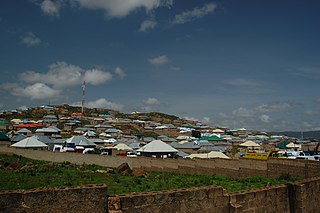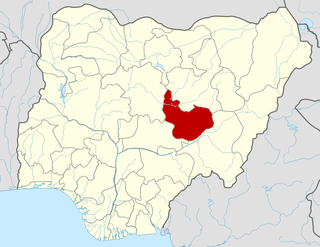Miango | |
|---|---|
Town | |
 | |
| Coordinates: 09°51′N08°41′E / 9.850°N 8.683°E [1] | |
| Country | |
| State | Plateau State |
| LGA | Bassa |
| Chiefdom | Irigwe |
| Time zone | UTC+01:00 (WAT) |
| Climate | Aw |
Miango is a town in Plateau State, in central Nigeria.
Miango | |
|---|---|
Town | |
 | |
| Coordinates: 09°51′N08°41′E / 9.850°N 8.683°E [1] | |
| Country | |
| State | Plateau State |
| LGA | Bassa |
| Chiefdom | Irigwe |
| Time zone | UTC+01:00 (WAT) |
| Climate | Aw |
Miango is a town in Plateau State, in central Nigeria.
Miango is a Town in Bassa Local Government Area of Plateau State. The natives of this village are the Irigwe people, who are very hospitable and friendly. There are a lot of tourist attractions in the village like Water falls, High hills, the Miango rest home, etc. In the early 1900s the SIM Missionaries came to the area and established the Miango Rest Home. Miango rest home which is closer to ENOS HOSPITAL, the only massive licensed hospital in the community which started operations in 2011. Christianity was brought to the region by ECWA missionaries who also built churches and a couple of schools.
Miango and the surrounding communities has a population of over 20,000 people, more than 50% of which are women and children.
Though the region is sometimes plagued by religious crisis, Miango people are very friendly and industrious. Many of them are farmers and are responsible for supplying enormous amounts off eggs, fresh red pepper, maize, tomatoes, big sized Irish and sweet potatoes, carrots, cabbages, water melon, cucumber, wheat and bean to the rest of Nigeria.
On 8 September 2017, Fulani tribesmen attacked and killed twenty Christians in an apparent reprisal attack in the village of Ancha, Miango District. A week earlier, a young Fulani boy from Ancha had been found murdered in a nearby village. The Muslim Fulani believed that the boy had been killed by Christians from Ancha, a fact that the locals strongly denied. [2] Nineteen members of Ancha's Salama Baptist Church were among those killed. [3]

The Fula,Fulani, or Fulɓe people are one of the largest ethnic groups in the Sahel and West Africa, widely dispersed across the region. Inhabiting many countries, they live mainly in West Africa and northern parts of Central Africa but also in South Sudan, Sudan, and regions near the Red Sea coast. The approximate number of Fula people is unknown due to clashing definitions regarding Fula ethnicity; various estimates put the figure between 35 and 45 million worldwide.
The Yelwa massacre was a series of related incidents of mass violence between Muslims and Christians which took place in Yelwa, Nigeria between February and May 2004. These incidents killed over 700 people. The first occurred on 4 February 2004 when armed Muslims attacked the Christians of Yelwa, killing more than 78 Christians, including at least 48 who were worshipping inside a church compound. According to some sources, the signal for the attack was a call for Jihad from the local mosque.

Adamawa is a state in northeastern Nigeria, whose capital and largest city is Yola. In 1991, when Taraba State was carved out from Gongola State, the geographical entity Gongola State was renamed Adamawa State, with four administrative divisions: Adamawa, Michika, Ganye, Mubi and Numan. It is the home of the American University of Nigeria in Yola, Modibbo Adama University of Technology Yola, Adamawa State Polytechnic, Yola and Adamawa State college of Nursing and Midwifery. It is one of the thirty-six states that constitute the Federal Republic of Nigeria.

Jos is a city in the Middle Belt of Nigeria. The city has a population of about 900,000 residents based on the 2006 census. Popularly called "J-Town", it is the administrative capital and largest city of Plateau State.

Plateau is the twelfth-largest state in Nigeria. Approximately in the centre of the country, it is geographically unique in Nigeria due to its boundaries of elevated hills surrounding the Jos Plateau its capital, and the entire plateau itself.

Northern Nigeria was an autonomous division within Nigeria, distinctly different from the southern part of the country, with independent customs, foreign relations and security structures. In 1962 it acquired the territory of the British Northern Cameroons, which voted to become a province within Northern Nigeria.
Adama ɓii Ardo Hassana, more commonly known as Modibbo Adama, was a Fulani scholar and holy warrior, who hailed from the Ba'en clan of Fulbe. He led a jihad into the region of Fombina, opening the region for Fulani colonisation. As a result of Adama's constant warring, the Fulani today make up the largest ethnic group in Northern Cameroon, and Islam is the dominant religion. The wars also forced many peoples south into the forest region.

The Evangelical Church Winning All, previously known as the Evangelical Church of West Africa, is one of the largest Christian denominations in Nigeria, with about ten million members. ECWA is a partner church of the international Christian mission organisation, Serving In Mission (SIM), formerly Sudan Interior Mission. ECWA was founded in 1954 when the SIM-related churches came together to form an indigenous body. Since that time, mission stations, Bible Schools, academic schools, and medical programs have been transferred to ECWA leadership.
The Middle Belt is a term used in human geography to designate a belt region stretching across central Nigeria longitudinally and forming a transition zone between Northern and Southern Nigeria. It is characterised by its lack of a clear majority ethnic group, and is the location of Nigeria's Federal Capital Territory. The eminence of manifold minority groups, to some degree, constitutes an ethno-linguistic barrier in the country and draws a separation between the principally Muslim North and the mainly Christian south.
Wusasa is a town just outside the major city of Zaria in Kaduna State in Northern Nigeria.

The 2008 Jos riots were riots involving Christians and Muslims over the result of a local election on 28 and 29 November 2008 in Jos, a city in the Middle Belt region of Nigeria. Two days of rioting left hundreds injured and at least 761 dead. The Nigerian army was deployed and by November 30 order was restored.
Sanga is a Local Government Area in southern Kaduna State, Nigeria. Its headquarters is in the town of Gbantu. It has an area of 781 km² and had a population of 151,485 at the 2006 census. The postal code of the area is 801.

The 2010 Jos riots were clashes between Muslim and Christian ethnic groups in central Nigeria in and near the city of Jos. Jos is the capital of Plateau State, in the middle of the divide between the predominantly Muslim north of Nigeria and the predominantly Christian south. Since 2001, the area has been plagued by violence motivated by multiple factors. The clashes have been characterised as "religious violence" by many news sources, although others cite ethnic and economic differences as the root of the violence.

The Mambilla Plateau is a plateau in the Taraba State of Nigeria. The plateau is Nigeria's northern continuation of the Bamenda Highlands of Cameroon.
Tafawa Balewa is a local government area in the Southern part of Bauchi State in northern Nigeria. Its headquarters are in the town of Tafawa Balewa.

On 20 May 2014, two bombs exploded in Jos, Plateau State, Nigeria, killing at least 118 people and injuring more than 56 others. The first bombing occurred in a marketplace, and the second near a bus station. Though no group or individual has claimed responsibility, the attacks have been attributed to Boko Haram.

Communal conflicts in Nigeria can be divided into two broad categories:

Herdsmen attacks on unprotected villages in Nigeria have mainly involved disputes over land resources between herders and farmers across Nigeria but more devastating in the Middle Belt since the return of democracy in 1999. Often misrepresented as ethnic and/or religious conflicts, they are the result of economic, political and environmental tensions in the country. Thousands of people have died since the conflict began. Sedentary farming rural communities are often target of attacks because of their vulnerability. There are fears that this conflict would spread to other West African countries but this has often been down played by governments in the region.
On February 10–11, 2019, 141 people were killed in the Kajuru LGA of the Nigerian state of Kaduna according to the state governor, hours before the Nigerian general election. The dead included 11 Adara people and 130 Fulani. However the Fulani group Miyetti Allah was reported to have published a list of 131 Fulani who had died and it also stated that the bodies of 66 Fulani were recovered while the bodies of 65 other Fulani remained missing. An attack by suspected Fulani gunmen on Ungwar Bardi killed 11 Adara people. An Adara militia in turn attacked Fulani settlements. Miyetti Allah later clarified 66 were buried in graves and 65 remained missing.